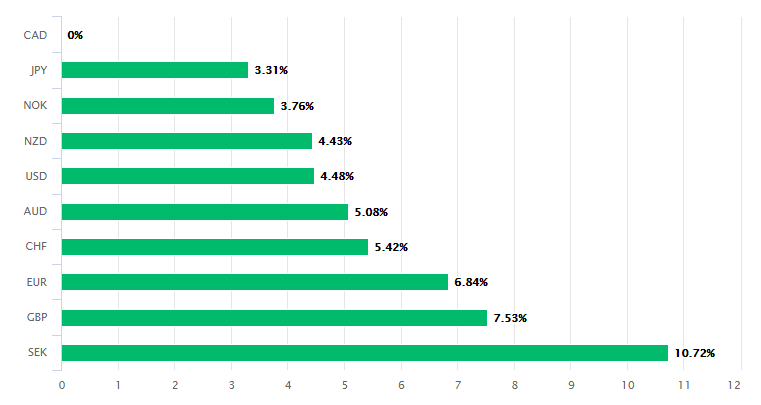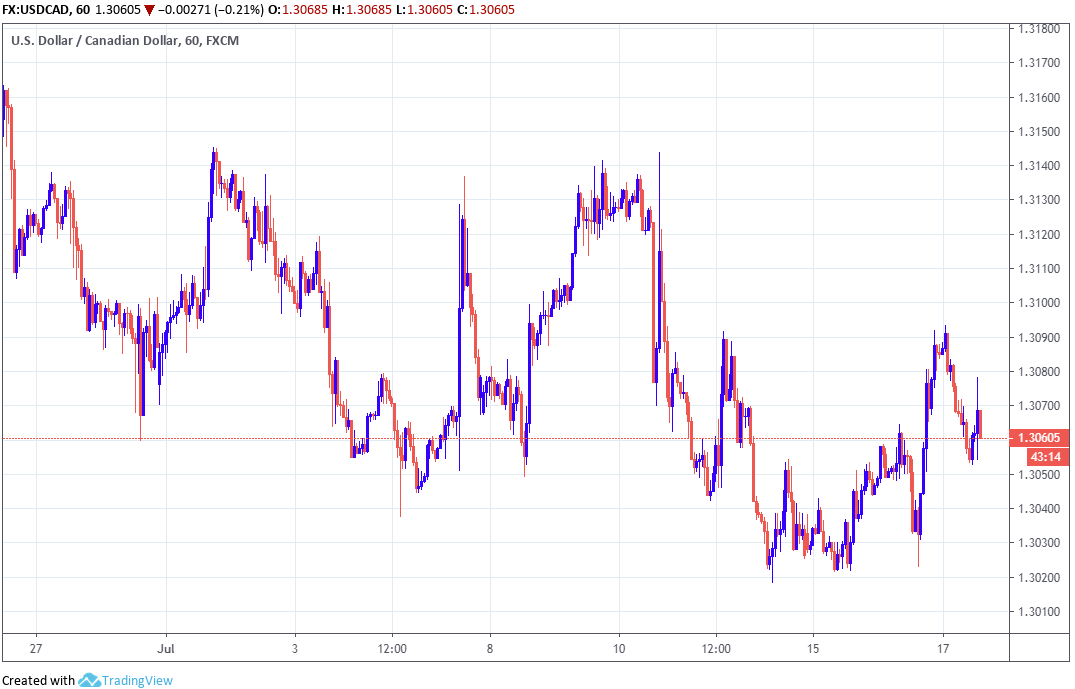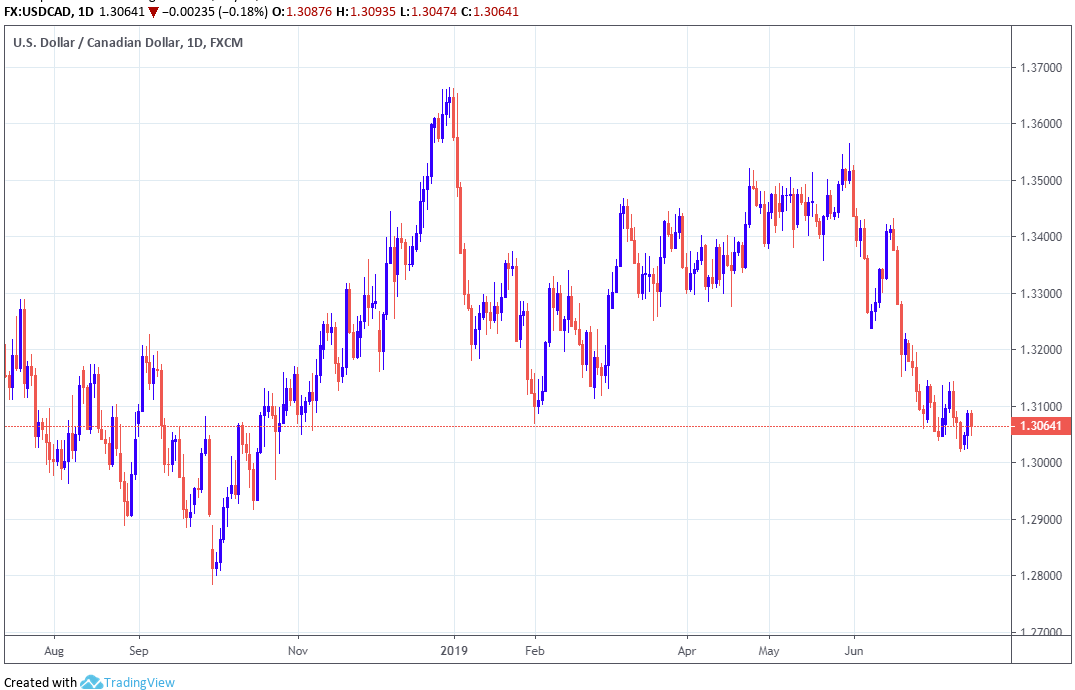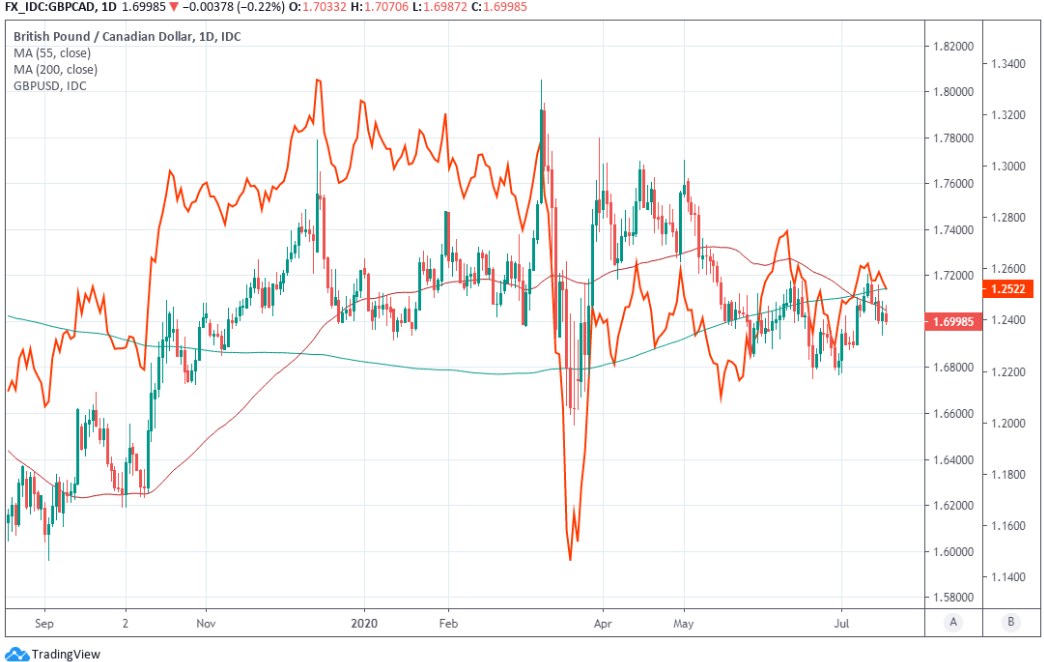Canadian Dollar Softer on Inflation Numbers, but Remains 2019's Dominant G10 Currency
- Written by: James Skinner

Image © Bank of Canada, Reproduced Under CC Licensing
- CAD softens after inflation returns to BoC target in June.
- RBC says data keeps BoC on hold, BMO offers different view.
- BMO eyes ption of BoC rate cut if Fed axes U.S rates steeply.
- GBP/CAD collapse not over yet say Scotiabank.
The Canadian Dollar softened with inflation on Wednesday, as markets responded to official data published by Statistics Canada, although the Loonie retains its seemingly unassailable grip on the top spot in the G10 league table and is expected to advance further against the Pound this week.
Canadian inflation fell by 0.2% in June, partly reversing the 0.4% surge seen back in May, which when combined with statistical 'base effects' was enough to pull the annual rate of price growth down from 2.4% to just 2%. That's right on the 2% target of the Bank of Canada (BoC).
The three measures of core inflation preferred by the BoC also averaged 2%, down from an average of 2.1% in May. Core inflation removes volatile commodity items like energy and food from the goods basket so is thought to better represent domestic trends in price pressures.
"After seasonal adjustment, the 0.1% increase in inflation ex-food and energy was a little below the underlying trend, however there was little change in the BoC's three core measures which averaged marginally above 2%," says Andrew Grantham, an economist at CIBC Capital Markets. "As expected, gasoline prices weighed on inflation in June, but that was offset to some extent by higher prices in traveller accommodation and air transport."

Above: Canadian Dollar performance Vs G10 rivals in 2019. Source: Pound Sterling Live.
"The expected inflation deceleration would allow the BoC to cut by 25bps in September if the Fed were to cut 50bps in July," says Stephen Gallo at BMO Capital Markets, in a note to clients ahead of the release. "We note that the BoC initiated its 2001 and 2007 easing cycles with both headline and core inflation running above 2.0%."
Markets care about inflation because it is the outlook for consumer price pressures that dictates central bank interest rate policies, and it's changes in the relative rate outlook which drive the capital flows that govern exchange rates.
Above-target inflation, and signs that price pressures are building from any level, often see markets raise odds on future interest rate hikes which would typically be taken as a positive for a currency. Falling inflation has the opposite effect: therefore today's data is weighing on CAD.
Canada's Dollar has nevertheless cemented its grip on the top spot in G10 during recent weeks after pulling more than 3% ahead of the nearest contender, the Japanese Yen, for 2019 as investors reward and economic performance and interest rate outlook that's at least appears more favourable than that seen elsewhere in the developed world. .
Financial markets have been betting the Bank of Canada will stand apart from the G10 crowd this year by keeping its interest rate steady even as the Federal Reserve (Fed) across the southern border cuts U.S. borrowing costs steeply, although some local analysts have said that exchange rate concerns could force the BoC to follow suit. "The longest period of near-target core inflation since the recession continues," says Josh Nye, an economist at RBC Capital Market. "2% core inflation is one of the key reasons the BoC doesn’t appear to be in any rush to follow the Fed in lowering interest rates."

Above: USD/CAD rate shown at hourly intervals.
"The BoC sees some scope for core readings to dip below target in the coming quarters (the lagged effect of the economy’s recent slowdown) but thinks inflation will be sustainably at 2% by the middle of next year. That is contingent on the economy returning to near-2% growth—which is where the BoC’s concerns about the global backdrop enter the picture," RBC's Nye writes, in a note to clients Wednesday.
The BoC emphasised risks to the economic outlook last week but stuck to its guns as far as its guidance goes, signalling that no change in its interest rate is likely in the short-term. It says the 1.75% cash rate is "accomodative" for the economy and that it will pay particular attention to "developments in the energy sector and the impact of trade conflicts on the prospects for Canadian growth and inflation" when making future interest rate decisions.
Changes in interest rates are only normally made in response to the inflation outlook, which is sensitive to growth, but impact currencies because of the influence they have on capital flows and their allure for short-term speculators.
Capital tends to flow in the direction of the most advantageous or improving returns, with a threat of lower rates normally seeing investors driven out of and deterred away from a currency. Rising rates have the opposite effect.

Above: USD/CAD rate shown at daily intervals.
"The outlook for relative central bank policy is dominating and the CAD remains fundamentally undervalued relative to our estimated equilibrium (USDCAD 1.2599) based on interest rate differentials and oil prices," says Shaun Osborne, chief FX strategist at Scotiabank. "We are medium-term CAD bulls anticipating continued gains toward levels last seen in mid October however we acknowledge the potential for near-term consolidation."
A solid set of retail sales figures for June took the market by surprise Tuesday and threw a lifeline to a struggling U.S. Dollar, leading some to the USD/CAD rate could now find support amid a period of sideways consolidation.
Time to move your money? Get 3-5% more currency than your bank would offer by using the services of foreign exchange specialists at RationalFX. A specialist broker can deliver you an exchange rate closer to the real market rate, thereby saving you substantial quantities of currency. Find out more here.
* Advertisement
GBP/CAD Move Lower Not Yet Over
The Pound-to-Canadian Dollar exchange rate meanwhile remains under intensifying pressure, with losses driven by mounting fears over the exact path the UK will likely take out of the European Union.
The Pound had vied with the Canadian Dollar for the title of best-performing G10 until April. but subsequent developments in the Brexit process and the resignation of Prime Minister Theresa May eight weeks ago changed Sterling's dynamic and it's now down more than 7% for 2019.
"The weight of significant technical negatives and a strong and persistent underlying downtrend suggests the move lower is not yet complete. Risks now are clearly tilting towards an overshoot to the 1.57/1.58 area, tested in 2016/18. There is no real support points to pick out on the chart between current levels and the 1.58 area," says Eric Theoret, a technical strategist at Scotiabank.
Many analysts are suggesting there are more losses ahead for the Pound because both candidates to replace outgoing Prime Minister Theresa May have recently hardened their language about negotiations with the European Union.

Above: Pound-to-Canadian-Dollar rate shown at weekly intervals.
Frontrunner Boris Johnson and foreign secretary Jeremy Hunt have said the so-called Northern Irish backstop in the current EU withdrawal agreement must goor the UK should contemplate leaving the bloc via a 'no deal' Brexit.
Most notably Jeremy Hunt, a Theresa May ally, has recently adopted the mantra that the backstop must go and that a 'no deal' Brexit should "remain on the table". He's been joined in his newfound position by another May cabinet stalwart, the work and pensions secretary Amber Rudd, who until recently was one of the most vociferous opponents of walking away from the talks and a key advocate in cabinet of a 'people's vote'.
Now, Boris Johnson is floating the idea that an early general election could be a good idea, which has further rattled the Pound because it would risk handing a mandate for a 'no deal' Brexit to government if one has not already been implemented while also threatening installing opposition leader Jeremy Corbyn in 10 Downing Street. Corbyn is a controversial candidate for PM in the eyes of the market given his socialist ideology.
"Sterling remains a broader under-performer and is liable to remain weak while Brexit uncertainty persists. Note EURGBP is trading well above 0.90 this morning," says Scotiaban's Osborne, in a note to clients Tuesday.
Time to move your money? Get 3-5% more currency than your bank would offer by using the services of foreign exchange specialists at RationalFX. A specialist broker can deliver you an exchange rate closer to the real market rate, thereby saving you substantial quantities of currency. Find out more here.
* Advertisement




